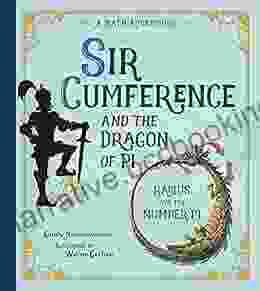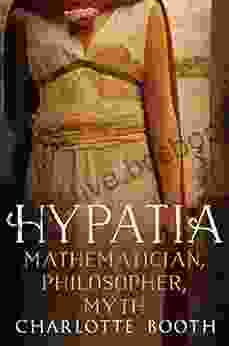Unveiling the Enigmatic Hypatia: Mathematician, Philosopher, Myth

In the tapestry of ancient history, Hypatia stands out as a luminous thread, weaving together the intricate strands of mathematics, philosophy, and astronomy. As a woman who dared to defy societal norms and pursue intellectual excellence, she has captivated the imaginations of generations. Her story, shrouded in myth and legend, has inspired countless works of art, literature, and scholarship.
In this comprehensive article, we embark on a journey to uncover the truth behind the Hypatia legend. We will delve into her early education, her groundbreaking contributions to science, and the tragic events that led to her untimely demise. By separating fact from fiction, we aim to shed light on the enigmatic figure of Hypatia and her enduring legacy as a pioneering intellect.
4.6 out of 5
| Language | : | English |
| File size | : | 4054 KB |
| Text-to-Speech | : | Enabled |
| Screen Reader | : | Supported |
| Enhanced typesetting | : | Enabled |
| Word Wise | : | Enabled |
| Print length | : | 175 pages |
| Lending | : | Enabled |
Early Life and Education
Hypatia was born around 350-370 CE in Alexandria, Egypt, a thriving metropolis renowned for its intellectual and cultural achievements. Her father, Theon of Alexandria, was a distinguished mathematician and astronomer who recognized his daughter's extraordinary abilities from a young age. He provided her with a comprehensive education that encompassed mathematics, philosophy, astronomy, and literature.
Hypatia's exceptional intellect and thirst for knowledge led her to master a wide range of subjects. She became an expert in Euclidean geometry, algebra, and trigonometry. She also delved into the works of Plato, Aristotle, and Plotinus, immersing herself in the philosophical debates of her time. Her pursuit of knowledge extended beyond the confines of her father's tutelage, as she sought out other scholars and engaged in lively intellectual discussions.
Contributions to Mathematics and Astronomy
Hypatia's brilliance extended far beyond her erudition. She made significant contributions to mathematics and astronomy, leaving an indelible mark on these fields. One of her most notable achievements was her commentary on Euclid's Elements, a foundational work in geometry. Hypatia's commentary provided valuable insights and clarifications, enhancing the understanding of this seminal text.
In astronomy, Hypatia played a pivotal role in the development of the astrolabe, an instrument used for measuring the positions of celestial bodies. She improved the design of the astrolabe, making it more accurate and versatile. Her contributions to astronomy also included the construction of celestial globes and the development of techniques for calculating the movements of planets and stars.
Teaching and Leadership
Hypatia's intellectual prowess and reputation as a scholar drew students from far and wide. She established a renowned school in Alexandria, where she taught mathematics, philosophy, and astronomy to both men and women. Her students came from diverse backgrounds, including wealthy aristocrats and aspiring scholars from across the Roman Empire.
As a teacher, Hypatia was renowned for her clarity, patience, and dedication to her students. She fostered an environment of intellectual freedom and encouraged her students to engage in critical thinking and independent research. Her teachings had a profound impact on her students, many of whom went on to become prominent scholars and leaders in their own right.
Tragic Demise
Hypatia's life and work came to an abrupt and tragic end in 415 CE. She fell victim to a mob of Christian zealots who accused her of practicing paganism and sorcery. The details of her demise are shrouded in mystery, but it is believed that she was brutally murdered and her body burned in the streets of Alexandria.
The reasons behind Hypatia's murder are complex and multifaceted. Some scholars believe that she became entangled in a political struggle between the Christian bishop Cyril and the Roman prefect Orestes. Others suggest that her independent thinking and outspoken nature may have threatened the authority of the Church. Whatever the motivations, Hypatia's death sent shockwaves through the intellectual community and marked a dark chapter in the history of Alexandria.
Legacy and Impact
Despite her tragic death, Hypatia's legacy lived on. Her writings and teachings continued to be studied and admired by scholars throughout the Middle Ages. Her commentary on Euclid's Elements became a standard textbook for mathematics students for centuries. Her contributions to astronomy also had a lasting impact, influencing the development of scientific instruments and methods.
In modern times, Hypatia has become an icon for women in STEM (science, technology, engineering, and mathematics). Her story inspires countless young women to pursue careers in these fields, breaking down barriers and defying stereotypes. She serves as a reminder that intellectual excellence and leadership are not limited by gender or societal norms.
Hypatia, the mathematician, philosopher, and astronomer, was a true pioneer of her time. She shattered the boundaries of what was expected of women in antiquity, making significant contributions to science and education. Her legacy continues to inspire and empower generations of scholars, and her story reminds us of the importance of intellectual freedom, critical thinking, and the pursuit of knowledge. Through her life and work, Hypatia left an indelible mark on the world, proving that even in the face of adversity, the indomitable spirit of human curiosity and creativity can prevail.
References
- Dzielska, M. (1995). Hypatia of Alexandria. Harvard University Press.
- Lloyd, G. E. R. (2002). Hypatia of Alexandria: Mathematician and Martyr. Bloomsbury Academic.
- Van der Waerden, B. L. (1961). Science Awakening. Noordhoff International Publishing.
4.6 out of 5
| Language | : | English |
| File size | : | 4054 KB |
| Text-to-Speech | : | Enabled |
| Screen Reader | : | Supported |
| Enhanced typesetting | : | Enabled |
| Word Wise | : | Enabled |
| Print length | : | 175 pages |
| Lending | : | Enabled |
Do you want to contribute by writing guest posts on this blog?
Please contact us and send us a resume of previous articles that you have written.
 Book
Book Novel
Novel Page
Page Chapter
Chapter Text
Text Story
Story Genre
Genre Reader
Reader Library
Library Paperback
Paperback E-book
E-book Magazine
Magazine Newspaper
Newspaper Paragraph
Paragraph Sentence
Sentence Bookmark
Bookmark Shelf
Shelf Glossary
Glossary Bibliography
Bibliography Foreword
Foreword Preface
Preface Synopsis
Synopsis Annotation
Annotation Footnote
Footnote Manuscript
Manuscript Scroll
Scroll Codex
Codex Tome
Tome Bestseller
Bestseller Classics
Classics Library card
Library card Narrative
Narrative Biography
Biography Autobiography
Autobiography Memoir
Memoir Reference
Reference Encyclopedia
Encyclopedia Christian Terwiesch
Christian Terwiesch Christina Gutekunst
Christina Gutekunst Chris Riddoch
Chris Riddoch Chris Mcmorran
Chris Mcmorran Christina Soontornvat
Christina Soontornvat Christina Scalise
Christina Scalise Cheryl Pallant
Cheryl Pallant Chaitanya Yechuri
Chaitanya Yechuri Chip Kidd
Chip Kidd Catia Chien
Catia Chien Chris Kennedy
Chris Kennedy Chris Werner
Chris Werner Christopher Menkhaus
Christopher Menkhaus Christine Ritchie
Christine Ritchie Charles E Schaefer
Charles E Schaefer Charlotte Collins
Charlotte Collins Christopher Griffin
Christopher Griffin Charles H Townes
Charles H Townes Catherine Stonehouse
Catherine Stonehouse Christopher Moore
Christopher Moore
Light bulbAdvertise smarter! Our strategic ad space ensures maximum exposure. Reserve your spot today!

 Richard SimmonsGuns And Love Reloaded Cherish Amore: An Unforgettable Tale of Romance,...
Richard SimmonsGuns And Love Reloaded Cherish Amore: An Unforgettable Tale of Romance,...
 Vincent MitchellSnoopy: The Master Chef – A Culinary Odyssey with the World's Most Beloved...
Vincent MitchellSnoopy: The Master Chef – A Culinary Odyssey with the World's Most Beloved... Amir SimmonsFollow ·6.8k
Amir SimmonsFollow ·6.8k Tyler NelsonFollow ·14.9k
Tyler NelsonFollow ·14.9k Colin RichardsonFollow ·5.6k
Colin RichardsonFollow ·5.6k Asher BellFollow ·14.8k
Asher BellFollow ·14.8k Craig CarterFollow ·15.3k
Craig CarterFollow ·15.3k Javier BellFollow ·5.6k
Javier BellFollow ·5.6k Winston HayesFollow ·16.2k
Winston HayesFollow ·16.2k James JoyceFollow ·5.9k
James JoyceFollow ·5.9k

 J.R.R. Tolkien
J.R.R. TolkienEscape to the Culinary Paradise: "Truck Stop Deluxe In...
Prepare your palate for an...

 Andres Carter
Andres CarterA Taste of the Unusual: Discover the Enchanting World of...
Prepare to be captivated by "Cindy Supper...

 Nick Turner
Nick TurnerChild Obesity: Introducing the Idea of Healthy Weight
Child obesity is a serious...

 Junot Díaz
Junot DíazGoing Local: Your Ultimate Guide to Swiss Schooling |...
In the heart of Europe, Switzerland boasts a...

 Raymond Parker
Raymond ParkerSir Cumference and the Dragon of Pi: A Mathematical Fable
In the enchanting realm of...

 Thomas Powell
Thomas PowellUnveiling the Enchanting Realm of Curious Creatures from...
Russian folklore is a rich tapestry of...
4.6 out of 5
| Language | : | English |
| File size | : | 4054 KB |
| Text-to-Speech | : | Enabled |
| Screen Reader | : | Supported |
| Enhanced typesetting | : | Enabled |
| Word Wise | : | Enabled |
| Print length | : | 175 pages |
| Lending | : | Enabled |








